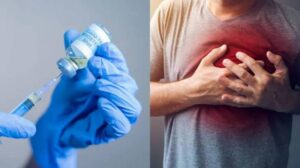AIIMS, in collaboration with ICMR and NCDC, has found no evidence linking COVID‑19 vaccination to sudden cardiac deaths among 18–45‑year‑olds
Doctors at Delhi’s All India Institute of Medical Sciences (AIIMS-Delhi) have refuted claims linking Covid-19 vaccines to sudden deaths in young adults in the country.

This comes in the backdrop of recent claims by Karnataka Chief Minister Siddaramaiah stating that covid vaccines were linked to sudden deaths due to cardiac arrest among young adults in the state’s Hassan district.
The country’s premier medical institution announced that its studies have found no such connection, instead attributing these tragic incidents primarily to lifestyle factors such as smoking, high blood pressure, and stress.
Senior AIIMS doctors emphasized the crucial role these vaccines played in saving lives during the pandemic, noting that the studies are ongoing to determine the causes of sudden unexplained deaths. Researchers at AIIMS’s pathology department are currently undertaking genomic studies to find the unexplained causes of death in approximately 25% of cases involving young individuals, where no apparent cause was initially identified.
The pharmaceutical industry has also vouched for vaccine safety and debunked doubts over efficacy.
Extensive Studies Underway
Dr. Abhishek Yadav, additional professor in the department of forensic medicine at AIIMS, detailed two studies conducted by his department. A retrospective analysis from 2018 to 2022, comparing pre- and post-Covid data, found “no surge in the sudden cardiac deaths in the cases which were reported in the department”.
A second, ongoing study, initiated in 2023 in collaboration with the Indian Council of Medical Research (ICMR) and slated to continue for another year and a half, aims to gather more samples for scientifically validated results. This study has so far examined approximately 230 death cases, collecting family history, performing genomic and DNA level studies, and utilizing virtual autopsies.
Dr. Yadav stated that this second study has also “not found any link between covid vaccine and sudden deaths.”
The research categorized cases into two age groups: 18-45 years and 45-65 years. Dr. Yadav said that coronary artery disease was identified as the most common historical factor, with over 50% of these cases linked to lifestyle factors and substance abuse, such as alcohol and smoking.
The pathology department of AIIMS is continuing genomic studies on the remaining 25% of unexplained cases.
Dr. Sudheer Arava, a professor in the department of pathology at AIIMS, explained that the study of 230 young individuals brought to the forensic department found heart attack to be the most common cause of death (50%), often linked to lifestyle risk indicators like high blood pressure, cholesterol, stress, and obesity. “In 25% of cases, no identifiable cause of death was determined, and researchers are exploring potential molecular alterations. An interim report submitted to the ICMR indicates that nearly 50% of the deaths studied were due to heart attacks, with further research ongoing.”
Vaccine Efficacy and Global Context
Dr. Sanjay Rai, professor at the department of community medicine at AIIMS, stated that the Covishield vaccine (developed by Oxford–AstraZeneca) showed an efficacy of 62.1%. He highlighted that various regulatory authorities have approved 37 different Covid-19 vaccines, with the World Health Organization (WHO) approving approximately 12, utilizing diverse technologies. For instance, Bharat Biotech’s Covaxin uses a traditional technology, while Covishield and Russian Sputnik V are based on an adenovirus vector.
Globally, over 13 billion vaccine doses have been administered, with countries like the United States completing fourth doses. The WHO now recommends vaccination for everyone aged six months and above, particularly with vaccines effective against newer variants.
Dr. Karan Madan, associate professor in the department of pulmonary medicine, affirmed that Covid-19 vaccines were “highly effective and instrumental in lowering mortality rates during the pandemic”. He emphasized their role as the “sole possible measure to save lives” at the time, providing “immense advantages” in preventing excess deaths. Dr. Madan also referenced a study on sudden cardiac deaths that found “no clear association” with vaccine usage.
Sudarshan Jain, secretary general of the Indian Pharmaceutical Alliance (IPA), underscored India’s role as a knowledge-driven sector, accounting for 60% of global vaccine production. He stated that Covid vaccines were “well documented and rigorously tested as per regulatory processes,” warning that “misinformation and distortion of facts endanger public health and undermine the trust built on science and patient care globally”.
The Indian Vaccine Manufacturers Association also said that all Covid-19 vaccines in India received Emergency Use Authorization based on extensive preclinical and human clinical trial evaluations, showing positive results for safety, efficacy, and immunogenicity.
Covid infections have been on a declining trend after showing a steady increase in the past few weeks. On Thursday, the country’s active caseload dropped to 1,290 from 1,691 cases, with no deaths reported in the last 24 hours. The total number of Covid-19-related deaths this year stands at 146. The current spread is linked to Omicron sub-variants NB.1.8.1 and LF.7.